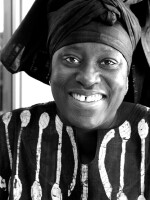As fighting intensifies between forces loyal to the two men who both claim to be Ivory Coast's rightful president, thousands of young supporters of the contested incumbent say they will join the army to "liberate" their country.
The would-be recruits are responding to a call that many fear increases the likelihood of renewed civil war, and a growing humanitarian crisis, following November's contested election.
For almost four months, Ivory Coast has been paralyzed by a political tug of war between disputed President Laurent Gbagbo and Alassane Ouattara, internationally recognized as president-elect.
In Abidjan, the chant and response at the army's headquarters Monday morning went: "We're ready to kill. Those little rebels are going to die. Would you like a Kalashnikov rifle?"
Thousands of men — most young, but some older — and a few young women gathered to enlist in the armed forces. Known as Young Patriots, they are followers of Charles Ble Goude, the man they call their streetwise general. He is the fiery youth minister in Gbagbo's government.
'We're Suffering'
At a mass rally over the weekend, Ble Goude urged his Young Patriots to sign up, asking: "Are you ready to fight to liberate your country?"
Thousands of his supporters said yes. "Let's free our country," they chanted.
Ble Goude has been under international sanctions, including a travel ban, since 2006 for inciting violence, extrajudicial killings, rape and pillage in Ivory Coast and attacks against U.N. peacekeepers. But he claims it's not his militant supporters who are behind the recent wave of killings in the commercial capital, Abidjan.

"We don't lead the country with militia. We don't need to kill people that we want to lead. My appeal is to the Young Patriots for them to be enrolled in the army to defend the country," Ble Goude says, adding that many are rushing to enlist.
"I ask all the youth of Ivory Coast, who feel able, who are ready to die for their motherland, who can no longer accept the humiliation suffered by Ivory Coast, to present themselves to the army chief of staff, in order to free our country from these ruffians," he says.
Jo Nicole, 23, is one of the few women to join the thousands of men who answered Ble Goude's call and lined up Monday to join the army. She says she's doing it for her young son.
"I've never taken up arms in my life, but we're suffering," she says. "Our country has been attacked by rebels and terrorists. We need to free this country. I'm not afraid. I'm going carry a [Kalashnikov] and liberate my country."
Residents Flee
Forces loyal to both Gbagbo and Ouattara blame each other's armed supporters for a surge in killings in Abidjan in recent weeks. International rights watchdogs say both sides are responsible, but that the Gbagbo camp has committed more rights violations. In the latest major attack Thursday, on a marketplace in the pro-Ouattara suburb of Abobo — which has seen the fiercest fighting in the city -- the United Nations says between 25 and 30 people were killed by mortar shells fired by Gbagbo's security forces.
The U.N. has warned of possible crimes against humanity. "We've expressed outrage and condemned the attack," says Hamadoun Toure, the spokesman for the U.N. peacekeeping mission. "It is just not acceptable in a built-up area. Whenever we think we've hit rock bottom, the situation gets worse and it's becoming unbearable for civilians. We are going to take all necessary measures to protect civilians, in line with our mandate."
Despite the U.N.'s pledge to protect civilians, long lines of residents are fleeing Abidjan. With their possessions piled high upon their heads and carrying giant plastic bags, children, women and men are heading out of town to their villages and across the border to Ghana and beyond.
Thousands more have been internally displaced by fighting in the lawless west of Ivory Coast, with more than 70,000 seeking refuge in neighboring Liberia, the U.N. says.
Fearful of a return to civil war, Ivorians are desperately hoping their leaders will make peace during the latest stage of hitherto failed African Union mediation expected later this week.
Copyright 2022 NPR. To see more, visit https://www.npr.org. 9(MDAzMjM2NDYzMDEyMzc1Njk5NjAxNzY3OQ001))







